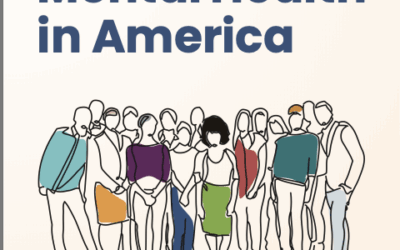Mental Health America (MHA) has released the State of Mental Health in America report for 2022, which ranks all 50 states and the District of Columbia based on several behavioral health and access measures. Almost 20% of people in the U.S. are living with a mental health condition, and over half of adults with a mental illness do not receive treatment, totaling over 27 million adults in the U.S. who are going untreated. A few more disturbing trends:The percentage of adults in the U.S. with a mental illness who report unmet need for treatment has increased every year since 2011
Over 60% of youth with major depression do not receive any mental health treatment.
The national rate of suicidal ideation among adults has increased every year since 2011-2012.
MHA gathers the most current data reported by the states and available to the public. These data are from 2019. They are most useful in providing comparative baselines in the states for the needs and systems that were in place prior to the COVID-19 pandemic. That data will not be made available until next year.
Virginia ranks:
- 20th overall among all the states. Virginia improved from 26th the previous two years, based on all 15 measures.
- 21st in overall youth rankings. Virginia’s youth mental health ranking slipped from 17th in the 2020 report to 21st overall.
- 55% of Virginia youth who experienced a Major Depressive Episode did not receive treatment. This was slightly better than most states, as the lack of treatment is a major problem across the country.
- 20th in overall adult rankings. Virginia’s overall adult ranking has fluctuated yearly, but improved this year from 29th to 20th in the rankings. In the 2020 report Virginia’s ranking was the worst in 5 years, down to 42rd after ranking 13th at one time.
- The improvement may be related to Medicaid expansion in Virginia, which took effect in January 2019 and improved access to care for over 300,000 adults in the first 8 months. Additional factors could be expanded services at local Community Services Boards, as well as increased prevalence of mental illness in other states.
- 37th in overall access to care for youth and adults, a slight improvement from 39th compared to other states. This ranking includes access to insurance, access to treatment, quality and cost of insurance, access to special education, and workforce availability. A low Access Ranking indicates that a state provides relatively less access to mental health treatment.
- 31st among all states in adults with a mental illness who reported they were not able to receive the treatment they needed. This was an improvement from 47th in the previous report, and may be related to Medicaid expansion.
- 40th in access to a trained mental health workforce. The lack of a sufficient workforce of mental health professionals is a problem in most of the country, and since MHA’s report began 8 years ago, Virginia is consistently near the bottom in this report.
In developing the report, MHA looked at 15 different measures available from every state to determine the rankings. They are not a complete picture of the mental health system, but do provide a strong foundation for understanding the prevalence of mental health concerns and access to treatment. The annual rankings are most valuable in tracking a state’s change relative to other states over time.
The data was collected in 2019, when Medicaid expanded in Virginia, a change that should continue to show improved access to care in next year’s report.
The initial impact of the COVID-19 pandemic will be reflected in next year’s report. Future reports should also reflect Virginia’s significant budget increases and policy initiatives to improve the state’s continuum of care, and prioritize access to mental health services.
Improving Virginian’s access to timely, affordable and culturally competent care will take more funding, better coordination and continued vigilance by all parties. Stakeholders, local and state government, legislators and private providers should treat the state of our mental health with urgency and creative partnerships.
State of Mental Health in America
Bruce N. Cruser, Executive Director
Mental Health America of Virginia



